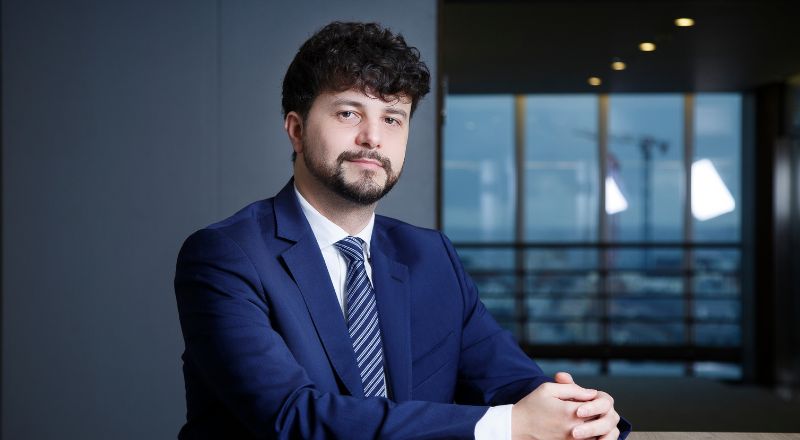The Special Committee on Artificial Intelligence in a Digital Age (AIDA) will have its work wrapped up well before the summer, but Brando Benifei (IT, S&D), Parliament’s rapporteur on the actual legislation regulating Artificial Intelligence (AI) use in the EU, will have to work a little longer.
While the AIDA report is in the last stages of committee work and expected to reach plenary in April or May, Benifei reckons that a plenary vote on the Artificial Intelligence Act can be expected for the autumn – if negotiations in the lead Committee on the Internal Market and Consumer Protection (IMCO), in the associated Civil Liberties, Justice and Home Affairs Committee (LIBE), and in the five further committees for opinion go well.
“It took a long time before we were able to decide how to divide the responsibilities in Parliament so, in fact, we are still in the early stages”, Benifei tells me.
Behind the internal discussions lies a division about how much AI should be regulated, with some MEPs, particularly on the centre and the nationalist right, arguing that too much regulation would stifle innovation and competition in Europe. Others, to be found mainly on the left of the political spectrum, underline the need to see fundamental rights protected and discrimination avoided.
“If we don’t have trust in a democratic context, we cannot develop a real usage of AI”
In an interesting initial outcome of Parliament’s process to grapple with AI, the more general report by the AIDA committee – Benifei calls it “a vision document” – was assigned to veteran free market stalwart Axel Voss (DE, EPP), and the legislative proposal to Benifei, who is not only its youngest member but also the leader of the Italian delegation in the S&D Group.
But Benifei believes not only that striking the balance between industry requirements and citizens’ protection is possible, but also that it is the only acceptable outcome.
Protection of citizens and consumers as well as support and encouragement for innovation and the development of an “ecosystem of AI” must be achieved in tandem, with the latter depending on much more than regulation, Benifei argues. To support this, he points to investment, including by EU programmes like Horizon and Digital Europe (DIGITAL).
Regulation, however, must create the necessary trust in society, believes Benifei.
“If we don’t have trust in a democratic context, we cannot develop a real usage of AI.”
A trustworthy environment is paramount, he explains, “so that we can tell citizens ‘please don’t worry, you can consider yourself safe by the procedures we put in place. You will not be spied on, you will not be manipulated, you will not be sold dangerous products’.”

Among his highest priorities for Parliament in inter-institutional negotiations, Benifei names a watertight regulation and certification process for biometric recognition technologies. “We have AI algorithms that are, as we find out only years after they are already applied, discriminating against women, or against people from disadvantaged backgrounds. These are actual cases we see happening in the world and in Europe.”
And on surveillance by AI in general, Benifei recognises that the legislative proposal presented by the Commission in April includes a general ban on surveillance in public spaces, but points to exceptions that are equally provided when the prosecution of terrorism and serious crime is concerned.
“What does that mean on a national level when we know there are countries in Europe where the concept of serious crime is disputable?” Benifei asks, adding a concrete example with reference to recent protests in Poland against the country’s near-total abortion ban: “Is it a serious crime to demonstrate against the government on abortion rights?”
Brando Benifei has been politically active since his school days and, having studied law in Bologna and London, he was first elected to the European Parliament in 2014 at the age of 28. Europe has been at the very heart of his politics from early on.
As a longstanding member of the Board and this term first President of Parliament’s Spinelli Group, which brings together MEPs actively supporting a federal evolution of the Union, it is unsurprising to find him also deeply involved in the ongoing Conference on the Future of Europe (CofoE) as an official parliamentary delegate.
“We don’t need to hear for the hundredth time that we must listen to young people”
He believes that now is the most crucial phase of the conference, which had held citizens’ panels on various aspects of EU policy starting in June last year and lasting until April, from democracy to social, environmental and culture policies, to name but a few.
“It is the most important moment for the conference because the next few months will transform these debates into recommendations”, Benifei tells me, adding that, in his experience, the current pandemic had transformed the process.
“In my opinion, some people in the Council and in the Commission thought initially that this conference could be some kind of ‘passarelle’ just to show that ‘yes, we listen to citizens’. “But then Covid happened, the conference had to be postponed, and when it came, people were in a different mood. Not just ‘let’s discuss, we’ll see’, but ‘let’s deliver on a stronger Europe, ready for new challenges’.”
It is clear to Benifei that the conference cannot be allowed to end with “just a document of good intentions”.
“We don’t need to hear for the hundredth time that we must listen to young people”, he says.
Instead, the minimum immediate outcome should, in his view, be a structured discussion about the recommendations which is aimed towards a convention with a mandate to reform the EU treaties.
This is because what the citizens came up with so far amounts to no less than a call for a “more ambitious, more united and more sovereign Europe” across the topics on debate, he argues.
On the topics Benifei followed most closely, “European democracy, values, rights, rule of law, security”, he cites citizens’ calls to overcome the veto system in Council, the creation of a Senate of the Union as a second parliamentary chamber, the introduction of pan-European referenda and the creation of permanent citizens’ councils.

While these ideas might surprise some seasoned EU-watchers, a survey commissioned by Parliament and carried out by Eurobarometer, which was published at the beginning of the month, seems to confirm this new tendency for ‘more Europe’, rather than less.
Finally, I wanted to bring up a topic that Brando Benifei counts among the most important successes of his parliamentary career so far: the European Child Guarantee.
As one of the Parliament’s negotiators for the European Social Fund Plus (ESF+) programme in the Multiannual Financial Framework (MFF) 2021 – 2027, adopted in December 2020, he successfully fought to earmark five per cent of the funds for Member States to combat childhood poverty, a “European emergency” in his eyes, at least for those countries with high levels of children living in poverty.
This new proposal was not popular in several Member States who resented the fact of being told so specifically where to put the money received from the programme, Benifei recalls.
He and his fellow parliamentary negotiators found themselves in a precarious position.
“The ESF+ was the last structural fund to be agreed, because we did not want to accept a watered down compromise”, he says.
But by postponing the decision, he felt they risked delaying the programmes. “I had to take a difficult decision”, Benifei admits.
One person, he says, was instrumental in Parliament’s negotiators not losing their nerve and standing firm: the late President of the European Parliament. “David Sassoli was very important at the time in supporting my conviction, and I am happy I stood with my other colleagues on this point because now we have a stronger framework for Member States to tackle child poverty.”
Sign up to The Parliament's weekly newsletter
Every Friday our editorial team goes behind the headlines to offer insight and analysis on the key stories driving the EU agenda. Subscribe for free here.